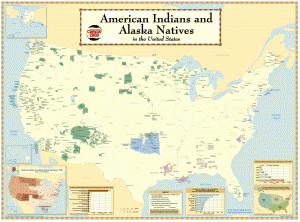“Political sovereignty and cultural sovereignty are inextricably linked, because the ultimate goal of political sovereignty is protecting…a way of life.”
-Richard West*
Over 180 years ago, John Marshall, a U.S. Supreme Court Chief Justice, declared that Indian tribes were not foreign nations, but were instead “dependent domestic nations.” Since the ink dried on that historic opinion, the scope of tribal political sovereignty has been contested in courts throughout the country.

With the guidance of Larry Nesper, a UW-Madison Associate Professor of Anthropology and American Indian Studies, this week TLAM explored the sometimes confounding history of federal Indian law. From the “Marshall Trilogy” to the Major Crimes Act that deprived tribes of the ability to address crimes committed again their own people on their own lands, it can be (as one one of our readings put it) completely byzantine–even for me, an attorney!
But political sovereignty isn’t the only kind. Although there’s no simple, one-sentence definition for cultural sovereignty, my sense is that it involves the notion of inherent sovereignty. Tribes are not sovereign because the U.S. government conferred sovereignty to them; instead, their sovereignty emerges from land, culture, and community–from things like language and stories (which we discussed last week) that necessarily predate colonization.
I’m also happy to say that those of us working with the Ho-Chunk House of Wellness may have an opportunity to help support some of those traditions with an upcoming grant proposal. If successful, the group hopes to use part of the award for cultural programming and to increase the Learning Center’s collection of Native materials.
Keep your fingers crossed!
Finally, we are in full-on training mode to better assist with the ongoing children’s collection cataloging and labeling project. Many of us attended a workshop taught by TLAM student group member Phillip Yocham on the use of Library Thing, a free web application used to catalog books in the collection. And, despite printer malfunctions and some office supply snafus, nearly 40 more titles were labeled. We hope to deliver them later this month!
-Megan Rosborough
*Quoted in Native Nations and Museums: Developing an Institutional Framework for Cultural Sovereignty by Rebecca Tsosie. http://www.tulsalawreview.com/wp-content/uploads/2010/10/Tsosie.Final_.pdf
And here’s a larger version of the map: http://www.education.wisc.edu/images/student-diversity-programs/aics-lesson1-americanindiansmapcensusbureau.gif
